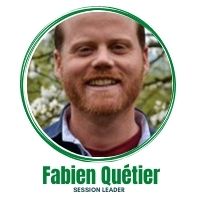SESSION 2: NO NET LOSS IN A CHANGING LANDSCAPE
April 26, 2021 (Monday) - 10 to 11:30 AM MDT
This session has now taken place. Thank you to everyone who attended.
A conversation with:
- Marian Weber, British Columbia Ministry of Environment & Climate Change Strategy Presentation
- Fabien Quétier, Biotope Presentation
- Florence Damiens, RMIT University Presentation
- Eric Higgs, University of Victoria Presentation
A spirited discussion of the many issues measuring ecosystem losses and gains to assess progress to no net loss. Those issues are magnified in an increasingly shifting landscape.
The goal of biodiversity offsetting is often said to be no net loss or net gain of biodiversity. The notion relies on a projected future, adjusted to account for development and offsets. This is manifest by the offset requirements of baselines, additionality, and equivalency. But “nature' is changing before our eyes, that its future may be less something we restore or reconstruct, and more something we design.
Join us for a provocative discussion on how key aspects of offsetting might apply in the Anthropocene.
Summary report - download the full report (all the sessions in a written form)
VIEW THE RECORDING
BIOGRAPHIES:
 |
Panelist: Fabien Quétier Fabien Quétier is currently the technical director on ‘No Net Loss’ and ‘Net Gain’ solutions for biodiversity at BIOTOPE, a consulting firm based in France. He advises clients, private and public decision makers, on the implementation of the mitigation hierarchy to projects and programs, by designing and leading the preparation of biodiversity baselines and assessments (including Critical Habitat and High Conservation Value assessments), action plans, and mitigation and offset management plans. This requires dealing with the technical, economic, legal and institutional challenges of on-the-ground assessment, management and restoration of biodiversity and ecosystem services, as well as complex conservation – development trade-offs.
|
 |
Panelist: Marian Weber Marian Weber conducts research on environmental policy including biodiversity offsetting. From 2003-2019 she was senior researcher with InnoTech Alberta where she worked with stakeholders to develop market based opportunities for managing ecosystem services. She was an executive member of the Alberta Association for Conservation Offsets and also a member of the Advisory Group of the Business and Biodiversity Offset Programme (BBOP). Marian is Adjunct Professor in the Department of Resource Economics and Environmental Sociology at University of Alberta and in 2019 became Chief Environmental Economist for BC Ministry of Environment & Climate Change Strategy. |
 |
Panelist: Eric Higgs Eric Higgs, Professor, in Environmental Studies at the University of Victoria, studies how we intervene responsibly in ecosystem undergoing rapid change. His work is anchored in ecological restoration, but has expanded in recent years to include appropriate ways of intervening in hybrid and novel ecosystems (ecosystems without historical precedent in an era of rapid ecological, environmental and cultural change). He has directed the interdisciplinary field-based Mountain Legacy Project studying long-term landscape change in Canada’s mountains using repeat photography explore. In addition to contributions to ES 200, he teaches courses on ecological restoration, a field course on Galiano Island, and contributes to a variety of ES courses. He is the author of articles and books, including Nature By Design (2003), Mapper of Mountains (2005; with Ian MacLaren and Gabrielle Zezulka-Mailloux), and co-editor of Novel Ecosystems (2013). |
|
Panelist: Florence Damiens Florence’s research interests lie in bridging political sciences, political ecology and biodiversity conservation to better understand how different political narratives and modes of governance affect biocultural diversity and sustainability. Her PhD is devoted to the politics of biodiversity offsetting, with a focus on Australia and France. She is also collaborating with researchers located in Australia and Europe to study changes in conservation-related policies. Florence has a Bachelor’s degree in Political Sciences from Paris Institute of Political Studies (Sciences Po) and a Master in Economics and Public Policy from Sciences Po and École Polytechnique. In the past, she has worked with various stakeholders in the fields of environment and biodiversity conservation in Australia, France and the Middle East. |